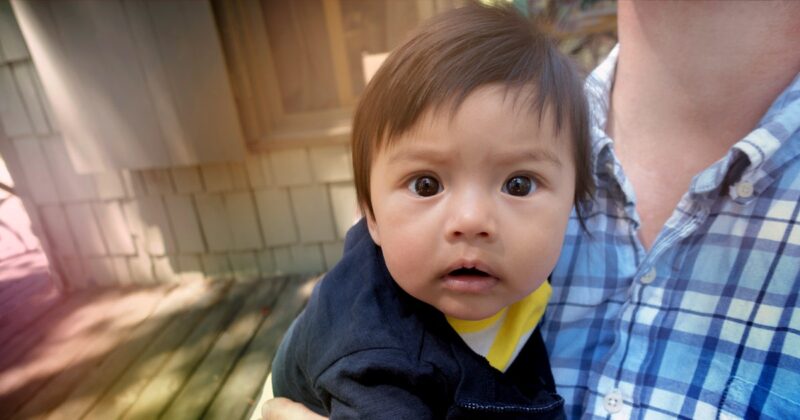Have you ever noticed that your child often stares at something for a while? When a baby stares once or twice, you think it’s random. However, parents are naturally concerned when they notice constantly staring at one thing/person and ignoring everything around them. So why do babies stare? Read on to learn the reasons behind babies focusing on one specific thing.
Baby’s Vision
To understand why your baby is staring at you, you first need to understand their vision. Here are some key points about your baby’s eye and vision development:
- Since newborns are sensitive to light, their pupils become very small when exposed to bright light.
- Things near the baby are easier to see than things farther away. This is because their central vision is still developing, while their lateral or peripheral vision is more developed.
- During the first two months, you may see your baby’s eyes crossed or turned to one side.
- When your baby is three months old, they can focus on objects 8 to 12 inches away.
- When your baby is five months old, they develop depth perception, that is, the ability to judge how far things are from them.
What Things Do Babies Stare at?

Wondering what grabs your baby’s attention? Well, here’s what your baby finds worth seeing:
1. Moving objects
Looking at a moving object like a ceiling fan stimulates your baby’s rapidly developing brain. Therefore, looking at moving objects stimulates and attracts your baby’s attention, which is an important part of your baby’s visual development.
2. Charming faces
Your baby loves staring at attractive faces, even when they’re three or four days old. Some striking features on your baby’s face will grab their attention.
3. Features
Some unique features of a face or object will interest your baby and attract its attention. Unique features may be glasses, beards, colorful hair or lights, or different textures.
4. Compare things
You may often find your baby staring at contrasting colors or outlines because they pique their interest.
5. Nothing
Sometimes you see your baby smiling and staring into space. You wonder why the baby is not looking at anything and smiling. Your baby’s vision is developing, so it’s normal for them to see more space than their eyes can see. So, when you see your baby looking at nothing, know that it means your baby is exercising their vision and eyes to finally see.
Common Reasons Why Babies Stare

Some common reasons your baby is staring are:
1. Understand the world around you
Your baby is born with 20/200 vision. So, to see something in the distance, they need to stare to understand what they are looking at. Also, they are fascinated by moving things, like the movement of your lips/eyes. So to learn about you and what’s around you, baby stares.
2. When they are tired
When your baby is tired or sleepy, they stare because they can’t stop looking at the exciting things around them.
3. Communication
Your baby can’t communicate with you through words or smiles, so it stares at you to connect with you.
4. When Something Interests Them or Catches Their Attention
Your baby will stare at anything that captivates them or grabs their attention. Sometimes, they may also be looking for something unique or different.
Why Do Babies Stare at You?
- You are beautiful
A study by a group of university professors shows that babies often stare at people because they think they are attractive.
In the study, babies were shown two pictures: one of someone deemed beautiful and one of someone deemed unattractive. Instinctively, children are attracted to pretty faces.
This has nothing to do with society’s aesthetic standards. Instead, it shows that even babies are attracted to people they find interesting.
So if you see a baby staring at you, it’s probably because he/she thinks you look special.
- You are different
do you have glasses? beard? Purple hair?
Remember, babies are new to the world. They are still learning about the world around them.
The baby may be staring at you because you have a feature he/she has never seen before! You might be fascinated by the little ones.
Why Do Babies Stare at Objects?
- It’s moving
Babies’ eyes are drawn to movement. That’s why they might stare at your spinning ceiling fan or the toy you’re hilariously playing with, making your baby smile.
Conversely, if your baby is moving away from moving objects, it may be because he/she is dealing with a lot of things that need to be regrouped.
If you are playing with your baby and he/she looks over the moving object you are playing with, don’t force his/her attention back to the toy. Give your baby some time to regroup.
- With contrasting colors
Babies’ eyes are drawn to strong contrasts. If there are two contrasting colors side by side, your baby’s eyes may be drawn to it. It could even be something as simple as a piece of furniture touching a wall. That’s probably why your baby is staring at things that don’t look like anything. He/she is still learning the world, so even simple things can fascinate your baby.
Why Do Babies Stare into Space?
- Their brains are developing
Just in the first 90 days of a baby’s life, their brain will grow by 64%! This means your baby is making many new connections and understanding many new things. So if your baby is staring into space, it’s probably because he/she is working overtime to develop his/her brain.
Some parents worry about whether their children are watching anything. Still, it could be a sign that their brains are working extraordinarily hard!
When to Worry About Your Baby Staring
While staring is usually a normal behavior for infants, the staring period beyond 4 months usually ends. If you notice your child staring for 20 to 30 seconds in the cold, especially if you can’t get their attention by talking to them or waving in front of them, ask your doctor if this could be a baby’s Signs of a mild seizure.
The Takeaway
You’ll notice a lot of changes in your baby’s personality during the first year. Babies observe everything around them, and staring is a sign that their brains are struggling to develop.
As always, if you have any concerns about your baby’s gaze or any behavior, please consult your pediatrician.



